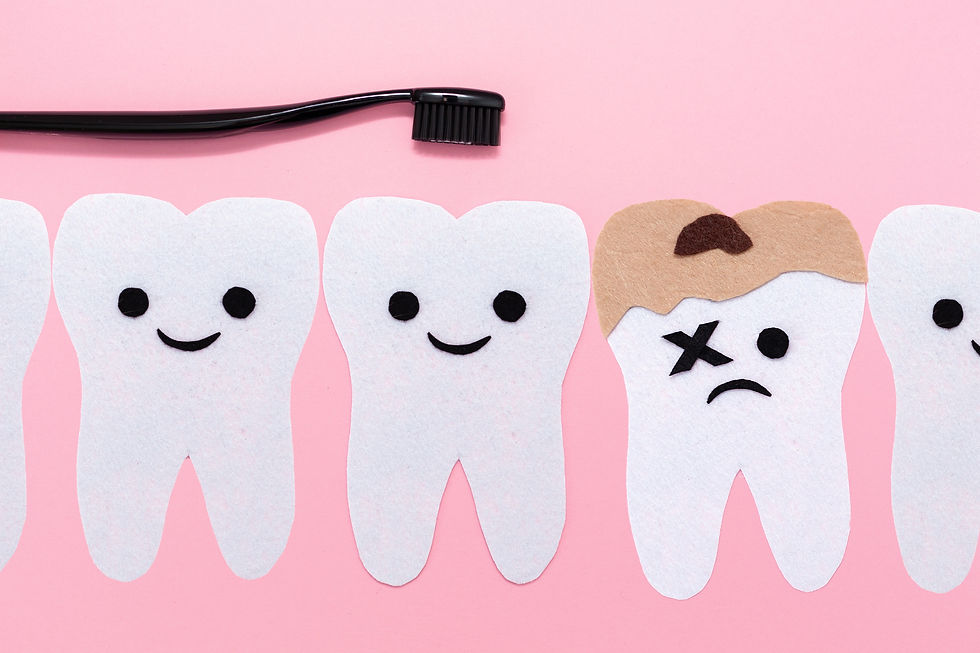How Can You Treat Sensitive Teeth? Learn With Seattle, WA Restorative & General Dentist
- Zen Dental Center

- Mar 17, 2022
- 3 min read
Updated: Mar 18, 2022

Got sensitive teeth? You’re not alone – an estimated 1 in 8 American adults have sensitive teeth that can make eating, drinking, and even brushing their teeth a painful experience. The causes of sensitive teeth can vary widely – from worn enamel, diseased or receding gums, exposed tooth roots, or damaged teeth (such as a dental cavity, or cracked or chipped teeth).
The first step to finding relief for your sensitive teeth should always be to visit your dentist to determine the cause of your sensitive teeth. We can recommend specific treatment once we determine the specific cause for your sensitive teeth. Good oral hygiene and care is often key to preventing sensitive teeth, so be sure to brush and floss daily, and visit your dentist regularly.
Tips and Treatments for Sensitive Teeth

1. Switch to a soft bristled toothbrush. If you have worn tooth enamel or receding gums, stiff toothbrush bristles and abrasive toothpastes (like charcoal and most whitening toothpastes) make the conditions worse! Stiff bristles are hard on both tooth enamel and gums, and can lead to exposed dentin (the softer layer beneath tooth enamel) and sensitive nerves. We always recommend using a soft
toothbrush and brushing gently but thoroughly twice daily.
2. Use a desensitizing, fluoridated toothpaste. These toothpastes contain ingredients that help symptom relief by blocking the transmission of sensation from the tooth surface to the nerves. Fluoride helps strengthen tooth enamel and prevent cavities as well. Desensitizing toothpastes must be used daily to have effect, and most users begin to notice sensitivity relief between 3 days and 2 weeks of daily use.
3. Dental coatings. There are several dental varnishes and coatings that we can apply to help relieve sensitive teeth. For example, a fluoride treatment or varnish helps fortify your tooth enamel and reduce the transmission of sensations. Ask us about coating options to help desensitize teeth.
4. Use a mouthguard at night. Sensitive teeth can sometimes be caused by bruxism, or habitual teeth grinding. If you clench or grind your teeth while sleeping, wearing a custom fit mouthguard at night can help a great deal in protecting your teeth against pressure and damage. Your dentist can take molds of your teeth and create a custom mouth guard that you can wear comfortably during sleep.
5. Restorative Treatment. If sensitive teeth are caused by damage to the tooth (such as from a dental cavity or cracked tooth), we can restore the tooth with a dental filling, bonding, or crown. If sensitive teeth are caused by receding gums and exposed tooth roots, we can treat the exposed root surfaces by applying bonding resin to the sensitive root surfaces in order to cover and protect them.
6. Surgical Gum Graft. An alternative to applying bonding to exposed tooth roots is a surgical gum graft, in which a small amount of gum tissue is taken from elsewhere in your mouth and attached to the affected area. Restoring gum tissue in this way can protect exposed tooth roots and reduce sensitivity.

7. Root Canal Therapy. Tooth sensitivity is sometimes caused by severe tooth decay or nerve damage inside the tooth. If sensitivity is persistent and severe and cannot be treated by other methods, we may recommend root canal therapy to eliminate the problem altogether.
8. Use a saltwater mouth rinse. A salt water rinse is a simple and quick solution for relieving mild oral discomfort and tooth sensitivity. Salt water balances the pH level inside the mouth, reducing bacterial growth and plaque, and helps reduce inflammation as well. Mix two teaspoons of salt in a cup (8oz.) of warm water, and use as a mouth rinse morning and night.
9. Avoid problematic foods and beverages. If you suffer from sensitive teeth, you are likely already avoiding hot and cold foods and drinks. But acidic foods and drinks also increase tooth sensitivity, because acid actively attacks tooth enamel and weakens gums. Examples of popular acidic foods and beverages include: coffee, sodas, fruit juices and fruit, alcohol, candies, tomato products (sauces, ketchup, etc.), and pickled vegetables. You may want to consider reducing or eliminating these foods and drinks from your diet. We also recommend drinking from a straw in order to limit the contact acidic liquids have with your teeth, and rinsing with water after consuming these types of foods and drinks to help rinse away and balance the acid levels in your mouth.
You don’t have to live with the pain of sensitive teeth! We are here to help, so don’t hesitate to contact us if you have any questions or concerns about tooth sensitivity and treatment.





.png)


